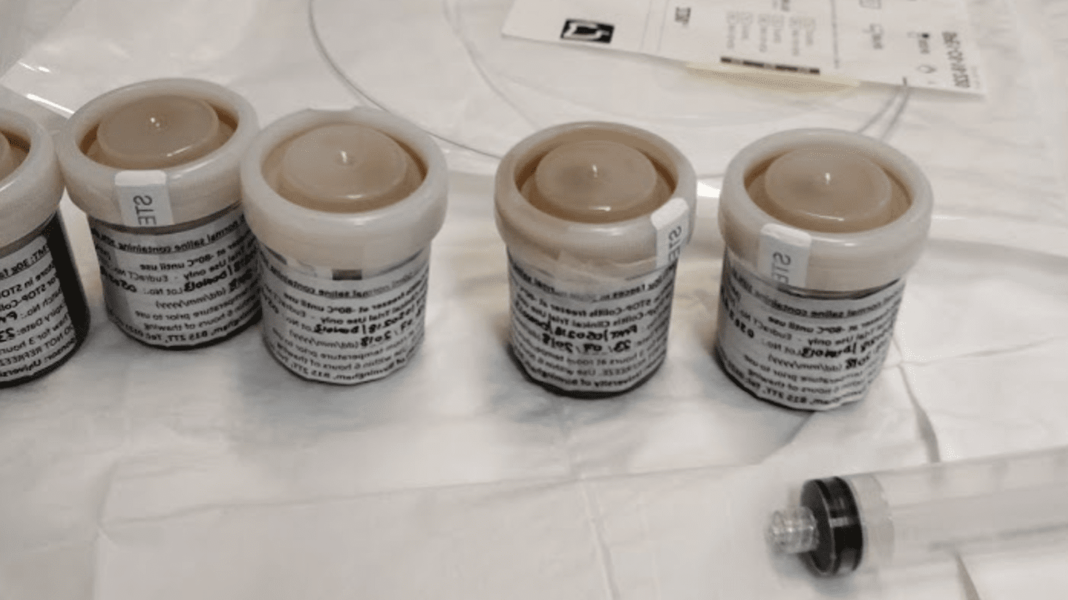BTN News: In a groundbreaking clinical trial, a 50-year-old British man named Rick Dallaway is pioneering an unconventional medical treatment: a fecal transplant. This innovative approach, also known as a microbiota fecal transplant (FMT), involves transferring healthy bacteria from a donor’s stool into a patient’s intestines to manage symptoms of primary sclerosing cholangitis (PSC), a rare and incurable liver disease. While the idea of using human feces as a therapeutic tool might seem bizarre, this experimental procedure could provide a new lifeline for those suffering from serious gastrointestinal and liver conditions. As Dallaway himself puts it, “If there’s a chance it might work, why not try?”
A New Frontier in Treating Liver Diseases
For Rick Dallaway, the journey began eight years ago when he was diagnosed with primary sclerosing cholangitis (PSC) — a chronic liver disease that narrows the bile ducts, potentially leading to liver failure. Like many others with PSC, Dallaway faced an uncertain future. With no known cure aside from a risky liver transplant in the final stages of the disease, he decided to explore alternative treatments. This led him to participate in a two-month clinical trial at the University of Birmingham, where fecal transplants were being tested for their potential to alleviate PSC symptoms.
What is a Fecal Transplant?
A fecal transplant, or microbiota fecal transplant (FMT), involves transferring beneficial bacteria from the stool of a healthy donor to the gut of a patient. Typically administered via colonoscopy, enema, or a nasogastric tube, the treatment aims to restore a balanced microbiome in the patient’s intestines. The procedure is most commonly used in cases of severe infections caused by the Clostridium difficile (C. diff) bacterium, which can lead to chronic diarrhea and is resistant to antibiotics.
The Science Behind the Experiment
Dr. Palak Trivedi, the hepatologist overseeing Dallaway’s trial, explains the rationale: “We aim to introduce a healthy composition of gut bacteria into the intestines of PSC patients to observe its effects on their liver condition.” This experimental therapy hinges on the idea that a healthier gut microbiome may positively impact liver health, although researchers are still investigating the exact mechanisms at play.
From the Lab to the Patient: How It Works
At the University of Birmingham’s Microbiome Treatment Center, donor feces undergo rigorous screening. Healthy individuals are selected based on their medical history, lifestyle, and comprehensive blood and stool tests to ensure no harmful pathogens are present. Once screened, the samples are frozen at -80°C and stored for up to 12 months. When a patient like Dallaway is ready for a transplant, the samples are thawed, filtered, and prepared for administration.
The Cost Factor: Fecal Transplant vs. Traditional Treatments
Surprisingly, the cost of a 50 ml liquid fecal transplant sample is approximately $1,700. This is significantly less than the combined expense of prolonged antibiotic treatments and hospitalization often needed for severe cases of C. diff. In many cases, a single administration of FMT is sufficient, offering a cost-effective alternative to more traditional therapies.
Barriers and Benefits: Public Perception and Cultural Taboos
While fecal transplants offer promising results, they face unique challenges. Some patients are hesitant, feeling uncomfortable about the idea of receiving stool from another person, even if it has been thoroughly screened and treated. A study by Crohn’s and Colitis UK found that initial resistance to the idea is common. However, after learning more about the potential benefits, a majority of participants showed a willingness to undergo the procedure.
Dr. Piyush Ranjan, a gastroenterologist in India, notes that “cultural, social, and religious beliefs often make patients reluctant to accept this type of treatment.” Nevertheless, education and awareness are slowly breaking down these barriers, encouraging more patients to consider the procedure.
Potential Risks and Global Expansion
While fecal transplants are generally safe when performed in clinical settings, they are not without risks. Dr. Benjamin Mullish from Imperial College London warns that unsupervised or home-based transplants can be “incredibly dangerous,” leading to severe health complications, including death in rare cases. To mitigate these risks, experts emphasize the importance of professional oversight and adherence to formal guidelines.
Currently, fecal transplants are officially approved only for treating severe C. diff infections in countries like the UK. However, experimental trials are expanding in countries such as the United States, Brazil, South Africa, and India, exploring the therapy’s potential for treating various conditions, including inflammatory bowel disease (IBD).
Looking Forward: A Ray of Hope for Patients
For now, fecal transplants remain an experimental treatment for liver diseases like PSC. Yet, the early signs are encouraging. With ongoing research and clinical trials, experts like Professor Tariq Iqbal from the University of Birmingham are optimistic about the future. “If we can prove its efficacy and safety, FMT could become a viable option for many more patients,” he says.
Rick Dallaway remains hopeful. “If someone had told me a decade ago that human feces could treat diseases, I wouldn’t have believed it,” he reflects. “But now, it’s a reality — and it’s happening.”
Conclusion: Bridging the Gap Between Innovation and Acceptance
As science continues to explore the potential of fecal transplants, both medical professionals and patients must navigate the delicate balance between innovation and public acceptance. With promising results emerging from clinical trials, this unconventional treatment could soon shift from the fringes of medicine to a recognized therapeutic option worldwide.


